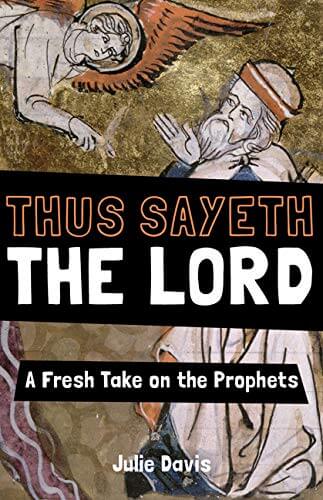
Book Review: ‘Thus Sayeth the Lord: A Fresh Take on the Prophets’
“Thus Sayeth the Lord: A Fresh Take on the Prophets.” By Julie Davis. Indiana: Our Sunday Visitor, 2020. 167 pages. Paperback: $15.95; Kindle: $11.99; Nook: $11.99.
In the 22nd chapter of Matthew’s Gospel, a Pharisee and scholar of the law tests Jesus by asking Him which of the commandments is the greatest. “(Jesus) said to him, ‘You shall love the Lord, your God, with all your heart, with all your soul, and with all your mind. This is the greatest and first commandment. The second is like it: You shall love your neighbor as yourself. The whole law and the prophets depend on these two commandments’” (Mt 22:37-40).
As 21st-century Christians, we are probably very familiar with the law of which Jesus spoke; Moses was the great law-giver and the law was embodied in the Ten Commandments. But despite the fact that we encounter them in the Sunday readings, we may find that we are not quite as conversant with the prophets.
Elijah, Isaiah and Jeremiah usually stand out for us, but what about the women like Miriam and Deborah? How about some of the minor prophets like Habakkuk or Daniel? And what place do we give the New Testament prophets like Anna and Simeon, John the Baptist or Jesus Himself? If the prophets are such an important part of the two greatest commandments, perhaps we should take the time to better acquaint ourselves with them and what they have to say.
That’s where Julie Davis’ latest book, “Thus Sayeth the Lord; A Fresh Take on the Prophets,” proves to be an invaluable resource. Her approach, though obviously knowledgeable, does not stray into the pedantic – one not need be a Scripture scholar to appreciate and understand what she is talking about.
In fact, one of the strongest points of this book is how skillfully Davis points out the absolute relevance of the prophets’ message to the here and now. For instance, when she is discussing Habakkuk, one of the minor prophets, she reveals right off the bat why we should even bother reading him (“all three chapters of peppy dialogue” as she phrases it.) “Habakkuk’s the guy for when everything is terrible, and I mean everything – society, government, the Church, the world in general – and you cry out to God to fix things. Now!” she says. “Of course, God’s idea of an awesome solution might not be just what we had in mind. And that’s when we really need Habakkuk.” If this sounds vaguely like the times we are living through, I think that’s her point.
I also appreciate an author who can be humorous without being disrespectful, and this is also evident in Davis’ book. Here, for instance, is a brief paragraph introducing Moses’ sister, Miriam, to the reader: “Maybe we’re distracted by all of little brother Moses’ flashy miracles … (but Miriam) is influential, an equal part of the prophetic team with the guys,” Davis says. “Miriam’s a prophetess, a leader, revered by the community and a lady with a strong personality. She’s also a bit of a troublemaker, but nobody’s perfect.” I don’t know about you, but an introduction like this makes me want to know a lot more about this woman.
Which is, of course, the reason Davis writes this way; these are people through whom God continues to speak, and we should want to know more, both about them and their message. Her approach makes that process inviting; it also makes the reader actually want to read the Scripture passages she references at the beginning of each chapter. In fact, if the reader follows through with the author’s suggestions, by the end of the book he or she may have read more of the Bible – especially the Old Testament – than he or she ever has before.
“These ancient, Hebrew prophets can help bring us closer to God’s love and his purpose in our lives,” Davis concludes. “(Once) we hear that incredible ever-new message from God, we might find our lives changed. Lean in. Let’s hear what he has to say.”
Author bio:
Julie Davis and her husband live in Dallas and have worked together at their graphic design firm for more than 30 years. They also have a small business facilitating movie discussion groups with senior communities, “Talking Movies.” Together they have two grown daughters.
Julie converted to Catholicism in 2000 and is very involved in Catholic online media and social media. She is author of “Happy Catholic,” “Lord, Open My Heart” and “Seeking Jesus in Everyday Life.”‘Thus Sayeth the Lord: A Fresh Take on the Prophets’

